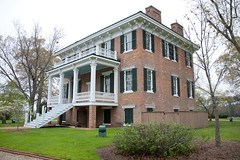Question by Brandi: How soon can you use a VA loan to purchase a home after a shortsale on an FHA loan?
My husband and I did a short sale on our home 15 months ago on an FHA loan, medications store because we were stationed over seas for three years it became to hard to hold onto the home. We would like to purchase another home using my husbands VA benefits now that we will be stationed stateside again. How long do we have to wait to use the VA loan?
Best answer:
Answer by Real Estate Guy
a shortsale is basically the sale as a FC. You will need to wait at LEAST 3 years, what is ed to 5 years.
Talk with a lender.
Give your answer to this question below!
A handful of nice mansion pictures I located:
Fairlawn Mansion

Image by chefranden
Welcome to Fairlawn Mansion & Museum. Fairlawn was built as the home of Martin Pattison who lived here with his wife Grace and six young children. Pattison, web a wealthy lumber and mining baron, help envisioned Fairlawn as a house befitting his good results. Construction began in 1889 and was completed in 1891 for a expense of ,000.
The 42 room mansion is built in the popular Queen Anne Victorian style of architecture. The proud four story turret makes Fairlawn a familiar landmark along Harborview Parkway. Other classic features of the Queen Anne style contain the home’s prominent porch, steeply gabled roof, and the use of contrasting colors and textures on the exterior trim.
Following Martin’s death in 1918, Grace Pattison donated Fairlawn to the Superior Children’s Residence and Refuge Association to be employed as an orphanage. Around 2000 children referred to as Fairlawn property during the 42 years it was a children’s house, from 1920-1962.
For much more houses click right here…
Mansion in Spring

Image by Sasha Vasko
Missouri Governor’s mansion.
Pentax K100D with Asahi S-N-C Takumar 35mm 1:three.5 lens.
If you would like to see more properties click here…
Getting Your Financial House In Order
There are also mortgage calculators that can show you how a larger down payment can lower your monthly mortgage payment. • Consider the positives—and the negatives—of … While many first-time borrowers believe 3.5 percent is the better option, more about the …
If you would like more informaiton please visit here…
How Much Does a House Cost?
Mortgage loans insured by FHA are pooled and readily sold to investors worldwide in huge amounts because the timely payment of principal and interest is guaranteed by the US Treasury. Many other US mortgages are pooled and sold under similar protection …
More informaiton please visit here…
Top 5 Predictions for the Housing Market in 2013
After slogging through years of crippling property value declines and foreclosures, case the housing market finally gained traction in 2012 as strengthening home prices, seek better sales, and more construction propelled the sector to be one of the only bright …
For more informaiton please visit here…
As 2012 Comes to a Close, Mortgage Rates Approach New All-Time Lows
“The modifications made to President Obama's Home Affordable Refinance Program are another boon to many borrowers, especially those underwater on their mortgages,” said Johnson. Set to expire on December 31, 2013, the program known as HARP 2.0 …
If you would like more informaiton please visit here…
Mortgage Rates: Low Mortgage Rates Remain Intact After Building Data Released
Existing mortgages that were sold to Fannie Mae or Freddie Mac prior to June 1, 2009 can refinance through the HARP program which does not require an appraisal, in most cases, and has no loan to value limits. This means that even … FHA has always …
More informaiton please visit here…
Question by Jeanie S: What is private mortgage insurance and who gets the money when a person cannot fullfil their loan obligations?
If you don’t put down 20% on a home loan you must pay Private Mortgage Insurance. So with all these loans going belly up why did ppl pay this and who took the money?
Best answer:
Answer by stephenweinstein
The money goes to the lender. However, drugs not everyone paid PMI. As you mention, cost if someone puts down 20%, then they do not need to pay PMI. Also, a person does not need to keep PMI forever; once they pay back enough of the loan, they can drop the PMI.
Give your answer to this question below!
Question by Chase: Who is my best mortgage lender choice?
I am 20 years old and looking to buy a townhouse to renovate and resell. I found a house listed for $ 45, purchase 000. I would hope to get at least $ 20,000 extra to cover the cost of renovations. I am looking for the best FHA lender to deal with but I am not sure who the best would be. If anyone has any experiences or knows of any good ones i should try to contact I would appreciate it so much.
Best answer:
Answer by MyHandsAreMadeOfPasta
Just ask your realtor. They have the best experience and tips to local leads in your area.
Give your answer to this question below!
A few great mansion images I located:
Cheekwood Mansion

Image by fallingwater123
Cheekwood Mansion – Nashville, drugs TN.
View On Black Really Recommended.
TEXTURE: "Cloudy Texture" by irisb477
www.flickr.com/photos/emeraldrose/3402156146/in/set-72157…
Inventive COMMONS LICENSE: Attribution 2. Generic
creativecommons.org/licenses/by/2./deed.en
For more homes click here…
Mansion from Exit

Image by sfgamchick
Right here is their Haunted Mansion, capsule as noticed from the ride exit. Tough to get any great shots of it simply because the location was packed all day and I rode 1st factor in the morning.
Far more excellent houses click here…
Lee Hall Mansion

Image by cliff1066™
Lee Hall Mansion was completed in 1859, shop only two years before the American Civil War. Greek Revival structures, such as Margaret Mitchell’s fictitious plantation home Tara, are generally related with the antebellum South total with huge white columns and extended, rambling porches. Not all southern antebellum structures resembled Tara.
Lee Hall Mansion, for instance, consists of a blending of a lot of various architectural types. Italianate, Georgian, and Greek Revival specifics can be observed in a lot of elements of the home. For example, Lee Hall’s interior attributes a symmetrical Georgian floor strategy with rooms opening into a long central hall. However, the exterior of the residence has Italianate and, to a lesser extent, Greek Revival detailing. Lee Hall Mansion’s major style, nonetheless, is Italianate.
The Italianate style gained popularity in between 1850-1880, mainly due to the in depth writings of Andrew Jackson Downing, Calvert Vaux, and Samuel Sloan. Element of the Picturesque movement, these authors romanticized the Italian villa and the countryside. Their publications not only addressed constructing exteriors, but highlighted trendy interiors and picturesque gardens.
The Italianate style was loosely based upon the Italian villa and can either consist of easy or elaborate styling. Italianate structures are normally two or more stories high and frequently have low hipped roofs with a wide overhang, supported by a bracketed cornice. Interiors are often identified by plaster cornices and ceiling medallions. Some structures are much more asymmetrical, featuring towers (cupolas) and bay windows.
In keeping with this main style, Lee Hall Mansion has 3 original plaster ceiling medallions in the property. The exterior is identified by a large low hipped roof with a bracketed cornice.
More excellent houses click right here…
Question by sarah w: How could I find information on cap rate scenarios for raw land?
If a large amount of raw land in a prime location is going to be marketed with cap rate scenarios (resort hotel, approved mobile home park, more about storage units, campground, shopping center, business offices, etc.), how could I find information on each of these scenarios? This information would have to include a rough estimate of building costs, loan information, rents, taxes, etc. Is there any way to get this information more easily than spending countless hours on dead ends? PLEASE HELP!
The information would be to help potential investors decide what to do with the property.
Best answer:
Answer by envision_man
This is a huge topic that cannot be completely covered here. I am a commercial Realtor in Texas, and I deal with development and raw land deals on a regular basis. CAP rate scenarios only truly apply to existing, income-producing properties. All you can do with raw land is create a prospectus. A prospectus is basically a business plan with a bunch of variables, one of which can be a CAP rate on the investment. This is directly tied to the NOI (annual Net Operating Income), which insinuates that the development is already built.
A developer has 2 ways of making money based on a CAP rate. The first is to hold the property over a long period of time, and collect revenue (like a landlord). The second is to fill the spaces (like in a retail center) and establish cash flow, and then sell the property to an investor on a pure CAP rate calculation. These two methods are very different in planning and execution.
Over the long term, a developer will try to get around a 15% return (not truly a CAP rate here) on his initial investment. That means that if they plan to spend $ 10,000,000 buying the land, building the building, paying commissions, paying management fees, etc, then they should earn an income of $ 1,500,000 in year one (before debt service, aka the loan payments). Because there are so many risks involved, the percentage must be high.
If the developer plans to sell right after leasing all the spaces (like in a retail center), then they sell the building based entirely on the CAP rate. If the building is 90% leased and earning $ 1,500,000 a year (after expenses), then they could likely sell to an investment group at an 8% CAP rate, which equals $ 18,750,000. If it only cost them $ 12,000,000 to build, then they profit over 50% on the deal (although this is not a CAP rate… it is a profit margin).
Without knowing where you are, it is impossible to guess what construction costs are. Also, the different developments vary immensely in price per foot, so it is impossible to speculate.
If a real estate group is advertising a raw piece of land with a CAP rate, just ignore it… it is just bad marketing. You cannot do a CAP rate this way at all. The only way this could be done is if the site plan is already done and approved, which shows exactly what sort of buildings are to be built and what sort of zoning is allowed, and perhaps if there are already leases signed in advance. But even then, there is no way to predict exactly the costs to build, so the conversation is moot.
In other words, the only person that can predict the CAP rate of any property is the developer himself. Any rates determined by others is just a marketing ploy.
If you would provide more specific info on what you are looking for, I might be able to assist you further. It would be good to know the following:
-What part of the country/state you are in
-How big of a development you are talking of
-What use specifically are you wanting (a retail prospectus is completely different than a self-storage prospectus)
-Are you looking at this from the seller’s perspective, or the buyer’s?
-Will this be an in-fill project (other parcels nearby are all occupied) or a pioneer project (lots of other vacant land in the area).
That’s all I have for now.
Give your answer to this question below!


